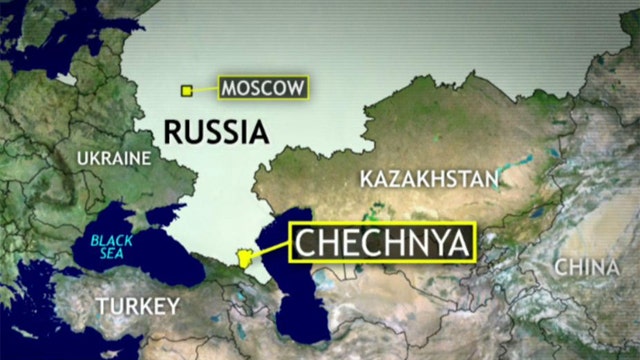If Chechen extremist groups were in any way associated with last week's Boston Marathon bombing, investigators will, in hindsight, see a path littered with warning signs -- which could lead them to the doorstep of one particular extremist group.
By now, it has been well-established that Chechnya is home to both separatists who want independence from Russia and Islamic radicals who see their cause as more global. Looking back, arrest reports and security studies show Chechen terrorists have been involved in a string of plots over the last several years in European and other countries, dropping clue after clue that they had aspirations beyond attacking Russia.
Of particular interest is a group formed in 2007 called the Caucasus Emirate, led by Doku Umarov. Two sources tell Fox News that investigators are exploring potential links between Tamerlan Tsarnaev, the suspect who died in a shootout early Friday in Boston, and the group -- though the organization has publicly distanced itself from the plot. Fox News is told that the Caucasus Emirate, designated as a foreign terrorist organization by the State Department in 2011, is one of several groups being investigated.
The group and others in the region have been very active over the last several years, analysts say.
"The CE is now part of a global jihadi revolutionary movement or alliance," said a 2011 report on the organization by the Center for Strategic and International Studies.
Back in 2010, a plot was uncovered in Belgium by a group called Shariah4Belgium. The suspects were from several different countries, but a few reportedly were ethnic Chechens. The same CSIS report said the individuals were suspected of plotting terror attacks in the country -- and recruiting and financing for the CE.
A separate report on the Caucasus Emirate from intelligence analysis firm Stratfor said a cell from the CE's network in the Dagestan region -- where the Boston bombing suspects apparently lived -- was uncovered in the Czech Republic in 2011 "planning operations in a third country."
Then, in August 2012, two Chechens and a Turk were arrested in Spain, as part of what officials suspected to be an Al Qaeda-tied plot to use remote-controlled planes to strike targets in Spain and elsewhere around the time of the London Olympic Games.
Another ethnic Chechen was found guilty by a Danish court in 2011 for plotting to bomb a Danish newspaper that published the controversial cartoons of the Prophet Muhammad in 2005. He was arrested the prior September after he accidentally set off a bomb at a hotel.
Some of these individuals could be lone wolves, and not tied to the CE or another group. U.S. officials still have not determined whether the Tsarnaev brothers are tied to a foreign group, though are looking at a lengthy trip the older brother took to Russia in early 2012. The brothers' uncle has claimed the siblings were radicalized in the U.S. and that Chechnya has nothing to do with their beliefs.
A statement released over the weekend by the Caucasus Emirate -- and translated by a prominent Chechen website -- appeared to distance the group from the Tsarnaev brothers.
"After the events in Boston, the US, information has been distributed in the press saying that one of the Tsarnaev brothers spent 6 months in Dagestan in 2012. On this basis, there are speculative assumptions that he may have been associated with the Mujahideen of the Caucasus Emirate, in particular with the Mujahideen of Dagestan," the group said. The organization said it is "not fighting against the United States of America. We are at war with Russia, which is not only responsible for the occupation of the Caucasus, but also for heinous crimes against Muslims."
The FBI has come under scrutiny after having been alerted in 2011 by a foreign government -- said to be Russia -- about Tamerlan Tsarnaev's activities.
"The request stated that it was based on information that he was a follower of radical Islam and a strong believer, and that he had changed drastically since 2010 as he prepared to leave the United States for travel to the country's region to join unspecified underground groups," the FBI acknowledged.
But the bureau said the suspect was interviewed and no "terrorism activity" was found.
Top House Republican lawmakers are now asking the FBI for its files on Tsarnaev, noting that despite this review he was allowed to travel to Russia and post "jihadist material on his social media."
Sen. Lindsey Graham, R-S.C., claimed Monday that his name was misspelled when he traveled, "so it never went into the system that he actually went to Russia."
The violence and insurgency in Chechnya dates back to World War II. Since the breakup of the Soviet Union, Chechnya has been at war with Russia twice. The second war started in 1999 when Russia went into Chechnya to restore control over the region. Since that time, other foreign fighters, including those with Al Qaeda ties, have taken up root in Chechnya, with groups like the Caucasus Emirate folding radical Islamic views into their mission.
Amid the fighting, thousands of Chechens have been killed, while Chechen fighters have been most known for launching high-profile and deadly attacks in Russia, such as the 2004 hostage taking at a school in Beslan in which hundreds, including children, were killed.
Some analysts have questioned the narrative that the Chechnya region was being heavily influenced by Islamic radicals.
University of Massachusetts at Dartmouth professor Brian Glyn Williams has described a more complicated picture. Williams told FoxNews.com that "there's a jihad element that has grown larger and more important" inside of Chechnya in the wake of bloody wars with the Russians. He said the official leadership is more secular and moderate, but there is an extremist element that sees the Russians as "infidels." He said the Al Qaeda links are tenuous, though Al Qaeda "sympathizes" with them.













































